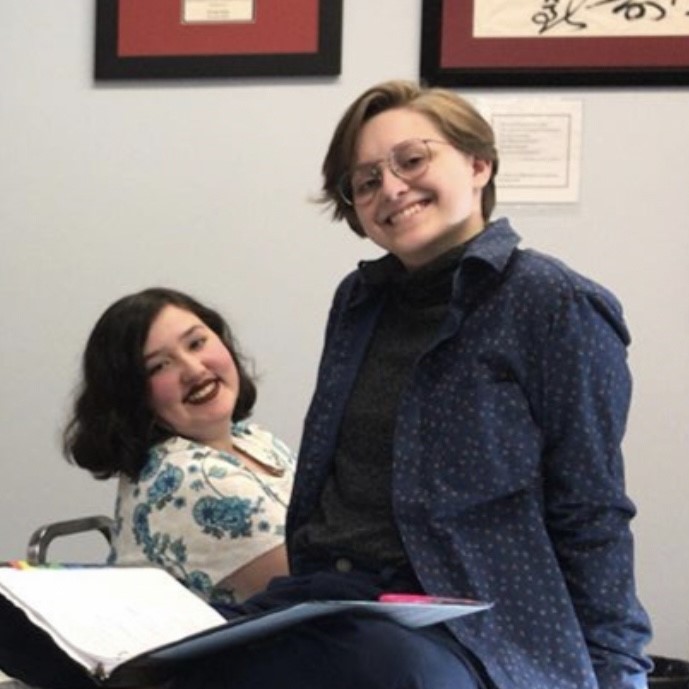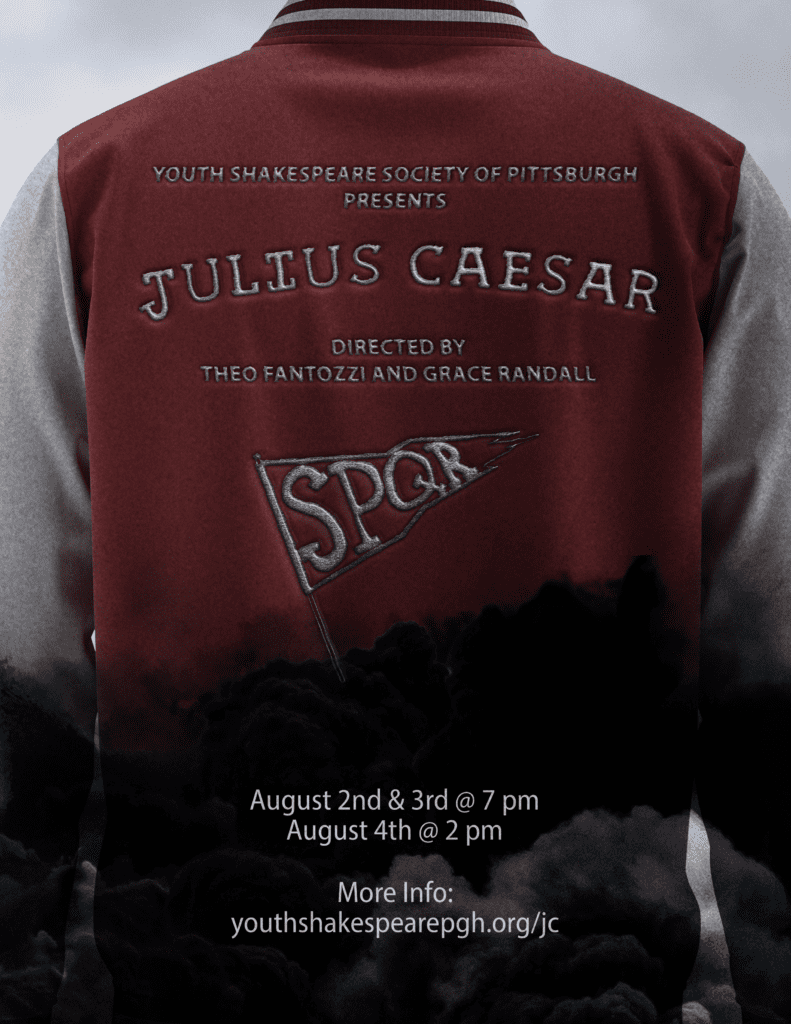This show has been a long time coming — what drew you to it in the beginning, and how has that shifted in the time since you originally created the concept?
Theo: Julius Caesar was one of the first Shakespeare plays I was lucky enough to perform in thanks to the Pittsburgh Public Theater’s summer Shakespeare camps – I fell in love with the powerful language and personal relationships underneath the weight of the story’s history. YSSP lets me work from the perspective of younger voices, a unique standpoint from which to view Shakespeare. I first approached Julius Caesar as a director in the year after Hamlet, and as I reread it, I couldn’t stop hearing the voices of these characters as teenagers forced to act in situations beyond their years. From there, I began working with Grace to develop a concept that would allow the text to support this idea. Julius Caesar already uses language that reckons with apocalypse and the end of days – the changeover in power is so severe that it warrants portents and prophecy – and placing the play post-apocalypse allows us to explore the play’s cycle of war and violence through a younger generation. It was also important to find a setting that would excite our actors and allow them to feel ownership of the material.
This particular concept has gone through many iterations and mediums over the last four years, and it’s been a godsend having Grace as a co-collaborator throughout the entire process. Our ability to sharpen characterization and deliver our version of the story while remaining loyal to the words Shakespeare wrote has matured as we have but the core of the play we want to create has remained steady. We’re at an exhilarating point in the process now where we begin to share this project with a wider team of people and allow them to influence and shape what we’re making together.

Theo and Grace working on Hamlet, their first project together through YSSP.
Grace: While our discussions about the concept for this show predate the beginning of the COVID-19 pandemic, the majority of its initial development took place at the beginning of quarantine, when nothing was certain, especially for Theo and I as teenagers. To a sixteen-year-old me, this narrative of high school students grasping at what little control they could after an apocalypse was a way to process the upheaval of daily life we were all experiencing in early 2020.
My appreciation for this show and for Theo as a collaborator has only grown in the years since we originally put the concept together. As we’ve each grown as people and as theatre-makers, we’ve been able to articulate our vision in sharper and sharper detail. It’s gone from a pipe dream, a “someday when we’re older and smarter,” to a tangible reality. It’s like picking up a cool rock when you’re a kid and learning later on how to crack it open and find a sparkling geode within it; we’ve found a way to bring something magical to the surface for everyone else to see. Our Julius Caesar is a story about what happens after the end of the world, and after living through a version of that ourselves, I’d like to think we’ve got a handle on how to tell that story.
What's your approach when you start directing a new show? Does your approach to this production differ at all from past shows you've worked on?
Theo: There’s more worldbuilding involved in this show than most I’ve worked on. To anticipate this, Grace and I have been doing a lot of work to help the actors and creative team find different ways into this world we’ve already spent so much time in, whether through music or visuals or something they can physically hold. Just looking for any way to invite them into this setting we’ve made and then empower them to play in it. At the end of the day, though, my approach to this show is the same as it would be for anything else: it starts with a deep and thorough understanding of the text we’re working from, and then it becomes my duty to pass that on to our actors so they have the tools to tell this story.
Grace: A theatre professor of mine once told my class that a director’s job is to make sure everyone involved in a production is telling the same story in the same way. To that end, I am absolutely delighted to have the production team we do for Julius Caesar. In our original talks about this show, Theo and I were adamant that in order to do our concept justice, we would need a robust group of designers and stage managers to help our ideas come to life. It’s existed for so long in our heads that it’s a bit daunting to open it up to the rest of the world, but I could not ask for a more talented group of artists to bring onboard.
What are you most excited to work on in the rehearsal process?
Theo: There are a few scenes that have been central to this particular production since its inception that I can’t wait to finally put on stage. Discovering the middle ground between your own expectations as a director and the instincts of your actors is one of the most exciting parts of the rehearsal process for me, and those moments will end up changed and elevated as a result of that collaboration. For a specific example, there’s a scene between Brutus and Portia featuring the song Strange Time – you may have seen it featured in our first promo video on our Instagram – that has become the guiding star for how their relationship is shaped, and I’m especially looking forward to being able to stage that scene with our actors. We’ve created a lot of small deviances from the original material through the intentional doubling of characters or shifting the context of lines, which I think will create new connections for audiences who know the play cover to cover and for complete newcomers to Shakespeare’s work!
Grace: As both a director and a costumer, I’m passionate about working with actors to find ways for them to inhabit their characters both literally and figuratively. Theo and I have our concepts, sure, but it’s actors who take these concepts and give them dimension, who make them feel like living, breathing people rather than ideas on paper. It’s what keeps 400-year-old plays fresh and enjoyable for people of all walks of life; the text may be the same, but each and every “et tu, Bruté,” no matter how iconic, will hold a different weight coming from a different voice. Finding that voice alongside an actor is one of the greatest joys of the rehearsal process for me, and I am so excited to go on that journey with our cast!

A teaser for the show poster of Julius Caesar.

